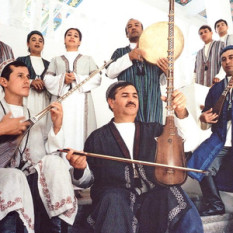Tajikistan, officially the Republic of Tajikistan (Tajik: Ҷумҳурии Тоҷикистон, Cumhuriyi Tocikiston; Russian: Республика Таджикистан, Respublika Tadzhikistan), is a mountainous landlocked country in Central Asia. It borders Afghanistan to the south, Uzbekistan to the west, Kyrgyzstan to the north, and China to the east. Khyber Pakhtunkhwa and Gilgit Baltistan in Pakistan are separated from Tajikistan by the narrow Wakhan Corridor.
Most of Tajikistan's population belongs to the Persian-speaking Tajik ethnic group, who share language, culture and history with Afghanistan and Iran. Once part of the Samanid Empire, Tajikistan became a constituent republic of the Soviet Union in the 20th century, known as the Tajik Soviet Socialist Republic (Tajik SSR). Mountains cover over 90% of this Central Asian republic.
Tajik music is closely related to Central Asian forms. The classical music is shashmaqam, which Uzbeks also developed classical music of Tajiks and made their distinctive own. Southern Tajikistan has a distinctive form of folk music called falak, which is played at celebrations for weddings, circumcisions and other occasions.
Tajik folk music is traditionally divided into three styles, Pamir (Mountain-Badakhshan province), Central Kuhistoni (Gissar, Kulyab, Garm provinces) and Sogdiana's northern style; the latter is part of the same musical culture as the adjacent regions of Uzbekistan (Kashkadarya Province and Surkhandarya Province). There are many kinds of songs, both lyrical and instrument, including work songs, ceremonial, funeral, wedding and musical epics, especially the central Tajik heroic legend Gurugli.
Gharibi is the song of a stranger, an early 20th century innovation of poor farm laborers and other workers who had to leave their land.
Badakhshan is a region inhabited by Pamiri Ismailis, known for their sung spiritual poetry called madah. Lutes are a major part of Ismaili folk music.
Gulgardoni is a springtime holiday (also called Boychechak) which includes carolling celebratory songs accompanied by the dutar and doira.
Sayri Guli Lola is the holiday of tulips, which includes accompanied choral and dance music. The most important song of this holiday is called "Naqshi Kalon".
The birth of a child is cause for special musical celebration. Traditional puppeteers play on the doira, qayroq, surnay and nag'ora. There are other variations, and folk songs like "Naat" and "Munojot", performed at the circumcision ceremony of a male child.
Traditional Tajik wedding music is played by sozanda, professional musicians, mostly female, who are part of ensembles called the dasta .






